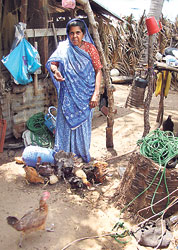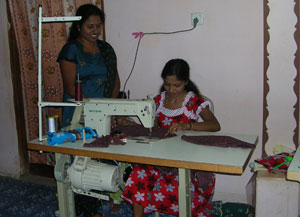BATTICALOA – For 44 year-old Adam Bawa Kasra, one of the most moving and emotional moments in her life came a few years back when her son received a letter at their home in Kattankudy in eastern Batticaloa saying he had been accepted as a medical student at a local university.
“I cried … I wept. I didn’t know what to do. I don’t know whether it was joy or an emotional moment,” she said, wiping away a few tears while sitting on the floor making stringhoppers. With help from an ADB-funded project, she makes and sells 700 to 1,000 stringhoppers a day compared to 200 earlier. Her son is a second year medical student at the Rajarata University.
 |
| Affected by the tsunami and the conflict, Thangamah is now supplementing the
family income |
Lifting communities from poverty is the main focus of the ADB-funded North East Coastal Community Development Project or NECCDEP which has also helped villagers, armed with better incomes, to provide their children a decent education and even send them to university, an unheard of development before.
During a two-day tour of Batticaloa and Trincomalee, a team of reporters were shown a plethora of projects under NECCDEP ranging mainly from micro credit schemes that have empowered women and enriched the lives of female-headed households, refurbished harbours for fishing communities and provided trading opportunities for women.
Perhaps from a reporter’s handbook, the biggest achievement this project has seen is providing livelihood and income-generating opportunities for women who would otherwise have gone to the Middle East, leaving a trail of social problems, broken homes and children without the necessary loving care of their mothers.
Take the example of Middle East returnee, Packeer Mohamed Khadeeja who was planning her eighth trip as a Sri Lankan domestic worker. As she prepared to return to Qatar, a neighbour mentioned NECCDEP’s micro credit scheme in which cheap loans and skills training are provided for self employment. She reversed the decision, learnt mat-weaving and changed her life.
“That’s the best move I made,” recalled Khadeeja, 49 years, seated in her home at Kantankudy. She weaves mats from reed and sells normal mats plus the exclusive ‘Mapala pay’ (for the bridegroom) at Rs 1,500 on special orders against Rs 300 for the normal mat. Kattankudy mats are popular in Colombo and Khadeeja roars with laughter when asked whether she has many orders for the ‘honeymoon mat’.
Jesmine Zubair, Treasurer of the local Women’s Rural Development Society (WRDS), says the need for migration is gradually disappearing with this micro credit programme which has transformed the lives of many women and the village.
Earlier at least 5 to 10 women went abroad. “That’s now coming down as women are able to earn a living here and support their family,” she said adding, “Even if we earn 5,000 Sri Lanka Rupees as against Rs 15,000, we are happy, have less problems and are with our families.”
 |
| Running her own business now: Rajakumari with one of her assistants |
More than 1.5 million Sri Lankans work in the Middle East. Some 50 to 60% are women – mostly from rural communities – employed as inexperienced domestic workers and often undergoing various hardships.
The project launched in 2005 and due for completion in November 2010 has many aims and objectives but basically sought to meet the needs of coastal communities in the eastern districts of Trincomalee, Batticaloa and Ampara where residents have been affected both by conflict and the tsunami.
Improving infrastructure like rural roads, markets, production centres and training facilities, and protecting natural resources like mangrove and combating sea erosion are among the range of activities undertaken by the project which has benefited more than 40,000 families in the East.
The end of the war has also brought relief and happiness to the region and that’s reflected through women like Muttiappa Thangamah from Naduthivu village in Trincomalee who rears poultry in her backyard to supplement the family income. The micro credit scheme helped her to secure a loan for her husband, a prawn fisherman who purchased nets and other necessities from the loan.
Like many families in the East, Thangamah and her husband have faced many challenges. They have been displaced many times. “We lost our house in the tsunami while my husband was unable to fish in the lagoon due to the fighting. Now that the war is over, we are very relieved,” she said, sprinkling food on the ground as the chickens’ gather in her backyard.
Says S.M. Croos, NECCDEP Project Director, “The project has led to social change, uplifted the lifestyles of the villagers and empowered women. For instance one woman’s earnings soared to Rs 30,000 from Rs 13,000 a month and she was able to buy a motor cycle for her brother to go to work.”
The project crisscrosses all communities without discrimination, has helped fishermen regain their livelihoods and provided livestock farmers greater opportunities to sell their milk. In Kinniya village in Trincomalee district, the ADB funded milk collection and pasteurized centre has eliminated the need for farmers to cycle 20 to 30 kilometres to Kantalai to sell their milk.
“Now I send it to the centre, right in the village and pedalling all the way to Kantalai is not necessary. There was a lot of wastage and loss earlier as milk sometimes got spoilt on the way,” Mohamed Lebbe, a 49-year-old farmer with seven children said, watching his herd of 60 buffalo and 20 cows graze on a dry rice paddy field. His daughter is doing an external Arts degree at Peradeniya University.
The centre is run by the farmers’ society with 240 farmers providing 2,000 litres of milk which is processed, packed and sent to the markets.
Programmes like this have also been structured to cater to the large number of female-headed households in the East. Batticaloa has the largest number of such households in the East with 25,272 from 153,074 families. There are 15,648 widows and 2,939 war widows while the rest have separated from their husbands; husbands have disappeared (due to the conflict) or are disabled and unable to work.
Another prominent feature in these communities is that the women marry very young, even at the age of 15 and a few years later are left without a husband like Jeyaratnam Imbarani, 41 yrs who married at 17 and at 19 lost her husband who was shot dead by unidentified persons while on the way to work. Collecting and selling firewood as a livelihood, she then learnt sewing and borrowed from the WRDS to set herself up in business. Now neatly dressed in a saree, she says her 21-year old daughter is doing a special university degree in education and wants to do a government job after qualifying. “I want her to have a secure job unlike my past,” she said at the WRDS centre at Pethalai village in Batticaloa.
Another example is that of H. Rajakumari, 40 years who got married at just 15 years while in school and was separated from her husband 18 years later. Working as a seamstress, she helped educate her only child, a daughter who at 22 years is a second year agriculture student at the Eastern Batticaloa University.
Last year she got a loan of Rs. 50,000, secured more training in design and sewing under NECCDEP and now makes more money than before, provides employment to two girls and intends to expand her business to three machines. “I built the boundary wall with earnings from increased business,” she said, wearing a nicely-designed salwar kameez at her home with the sounds of sewing machines at work in the background. |



